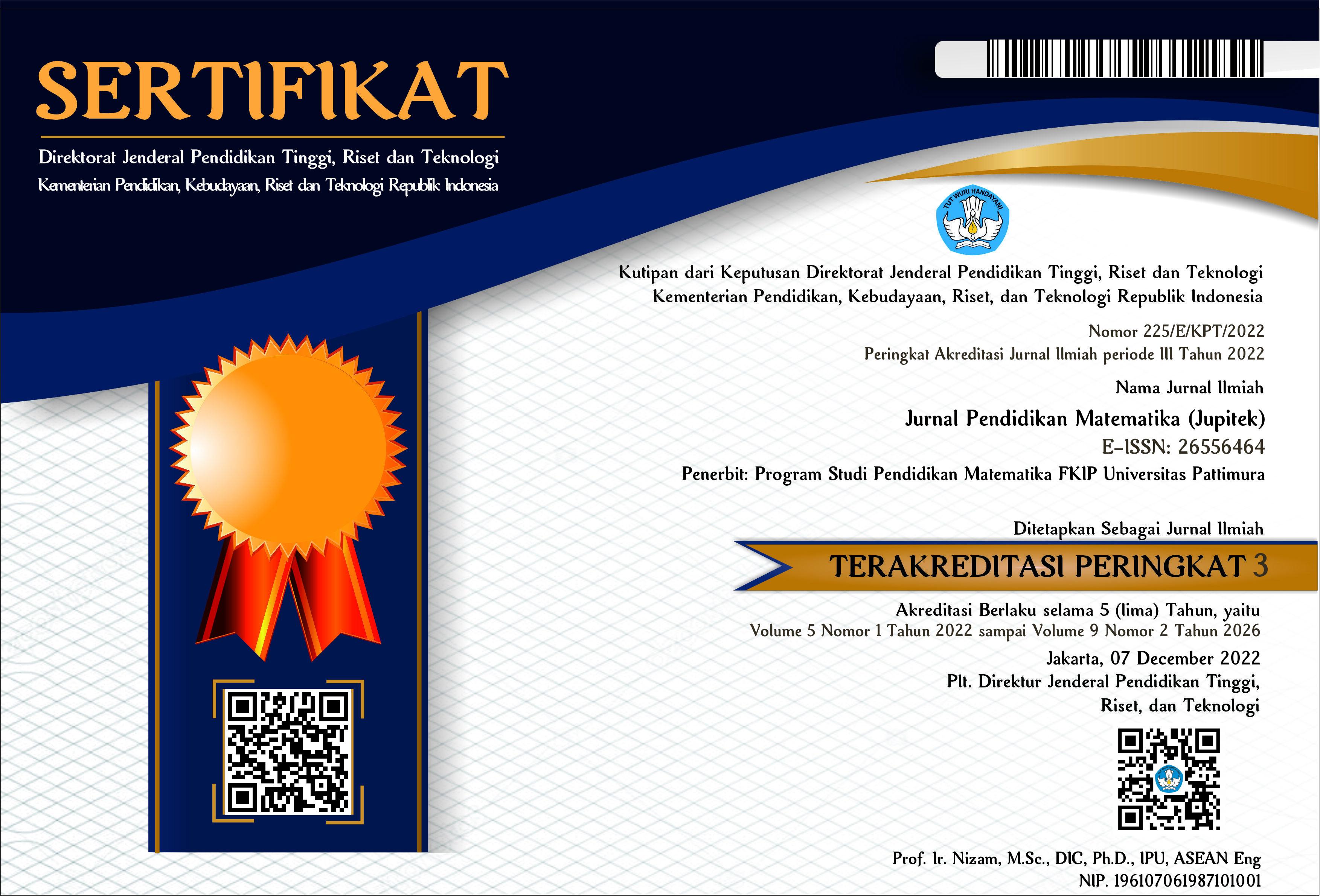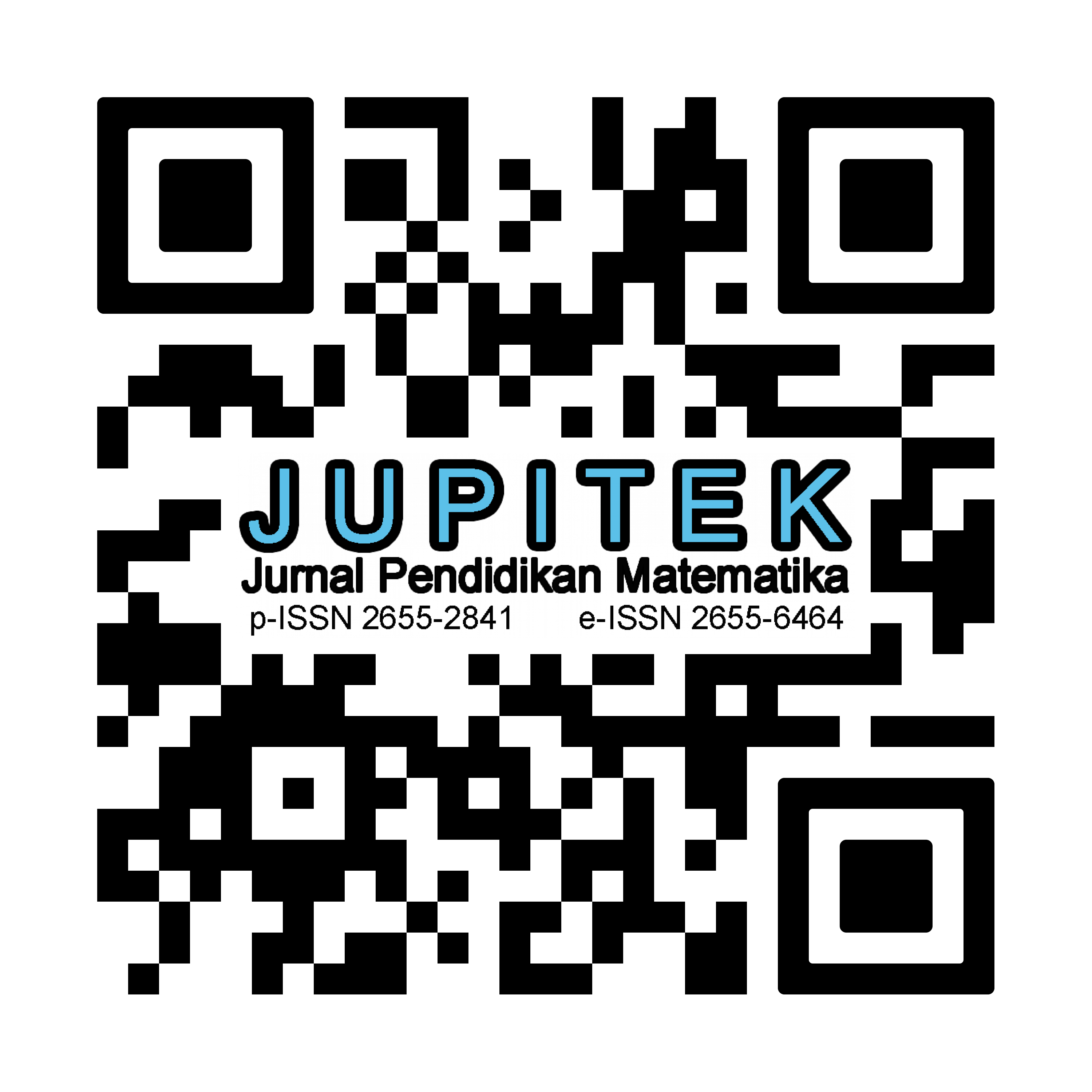MATH OBJECT IDENTIFICATION ON MATERIAL CULTURE ON THE ISLAND OF AMBON
Abstract
Mathematics learning will be more interesting if aspects of the cultural context around students are involved. In this regard, the identification of cultural aspects of both material and non-material culture needs to be continuously carried out and integrated into learning. This research is an exploratory study to identify the material culture in villages in the Central Maluku district on Ambon Island. There are 3 (three) sub-districts in the administrative area of Central Maluku Regency located on Ambon Island. In each sub-district, one village was selected as a sample village, considering that (1) the village is a traditional village and (2) cultural objects are still well preserved. In the Leihitu sub-district, Negeri/Village Hila was selected; in the West Leihitu sub-district, Negeri/Village Allang was selected; and in the Salahutu sub-district, Negeri/Village Tulehu was selected. Data collection was done through observation and interviews. Data were analyzed using descriptive qualitative. The identification process found that the material culture, in the form of traditional houses, bailey, forts, old churches, old mosques, fishing facilities, weaving, and food, is related to mathematical objects. Material culture can be a cultural context that is integrated into learning the concept of flat and spatial shapes
Downloads
References
Budiarto, M. T. (2015). Etnomatematika: Sebagai Batu Pijakan Untuk Pembelajaran Geometri dan Penanaman Karakter. In Proceeding of (pp. 11-12).
Mullis, Ina V. S., Michail O. Martin, Pierre Foy, & Martin Hooper. (2015). Trends in International Mathematics and Science Study: TIMSS 2015 International Results in Mathematics. TIMSS and PIRLS Lynch School of Education Boston Colledge.
Supriadi, S., Arisetyawan, A., & Tiurlina, T. (2016). Mengintegrasikan pembelajaran matematika berbasis budaya Banten pada pendirian SD Laboratorium UPI Kampus Serang. Mimbar Sekolah Dasar, 3(1), 1-18.
Ajawaila, J. W. (2005). Dinamika Budaya Orang Maluku. Dalam Maluku Menyambut Masa Depan [Cultural Dynamics of the Moluccans. In Maluku Welcomes the Future]. Ambon: Maluku Regional Cultural Institute.
Begle, E. G. (1979). Critical Variables in Mathematics Education: Findings from a Survey of the Empirical Literature.
Bito, G. S., Fredy, F., & Setyawan, W. H. (2021). Ethnomathematics: Design of Sabuk Tradisional (Keru) Bajawa as A Learning Media For Elementary School. ELEMENTARY: Islamic Teacher Journal, 9(1), 127-146.
Naja, F. Y., Mei, A., & Sa’o, S. (2021). Eksplorasi konsep etnomatematika pada gerak tari tradisional suku Lio. AKSIOMA: Jurnal Program Studi Pendidikan Matematika, 10(3), 1836-1847.
Panggabean, H., Tjitra, H., & Murniati, J. (2014). Kearifan lokal keunggulan global: Cakrawala baru di era globalisasi.
Pathuddin, H., & Nawawi, M. I. (2021). Buginese Ethnomathematics: Barongko Cake Explorations as Mathematics Learning Resources. Journal on Mathematics Education, 12(2), 295-312.
Ratumanan, T. G. and Reinhard Salamor. (2021). Kesiapan Guru Menghadapi Asesmen Kompetensi Minimal dan Literasi Numerasi Siswa SMP di Kota Ambon [Teacher Readiness to Face Minimum Competency Assessment and Numeracy Literacy of Junior High School Students in Ambon City] . Ambon: FKIP Pattimura University.
Ratumanan, T. G. and Imas Rosmiati. (2019). Perencanaan Pembelajaran [Learning Planning], Depok: Rajagrafindo.
Ratumanan, T. G. and Carolina Ayal. (2018). Problem Solving Based Learning Model Alternative Model of Developing High Order Thinking. International Journal of Health Medicine and Current Research Vol. 3, Issue 02, pp.857-865, June, 2018.
Ratumanan, T. G., et al. (2016). Kajian Mutu Pendidikan Sekolah di Maluku [Review of School Education Quality in Maluku]. Ambon: BAPPEDA of Maluku Province.
Ratumanan, T. G. and Theresia Laurens. (2016). Analisis Penguasaan Objek Matematika (Kajian pada Lulusan SMA di Provinsi Maluku) [Analysis of Mathematics Object Mastery (Study on High School Graduates in Maluku Province)]. Raflesia Mathematics Education, Vol. 1 No. 02, December 2016.
Sirate, Fatimah S. (2012). Implementasi Etnomatematika dalam Pembelajaran Matematika pada Jenjang Pendidikan Sekolah Dasar [Implementation of Ethnomathematics in Mathematics Learning at the Elementary School Education Level]. LENTERA EDUCATION, Vol. 15 No. 1 June 2012: 41-54.
Sutarto, Ahyansyah, Sukma Mawaddah, Intan Dwi Hastuti. (2021). Etnomatematika: Eksplorasi Kebudayaan Mbojo Sebagai Sumber Belajar Matematika [Ethnomathematics: Exploration of Mbojo Culture as a Mathematics Learning Resource]. JP2M (Journal of Mathematics Education and Learning) 7 (1), 2021, 33-42.

Copyright (c) 2023 Tanwey Gerson Ratumanan, Thereisa Laurens, Wilmintjie Mataheru

This work is licensed under a Creative Commons Attribution-NonCommercial-ShareAlike 4.0 International License.
License and Copyright Agreement
By submitting a manuscript to Jurnal Pendidikan Matematika (JUPITEK), the author(s) certify and agree to the following terms:
- Originality and Authority: The submitting author is authorized by all co-authors to enter into this agreement. The manuscript describes original work that has not been published previously in a peer-reviewed journal, nor is it under consideration for publication elsewhere.
- Approval: Its publication has been approved by all author(s) and by the responsible authorities of the institutions where the work was carried out.
- Rights: The authors secure the right to reproduce any material that has already been published or copyrighted elsewhere.
- Licensing and Copyright: Authors retain the copyright to their work.
- License Grant: The authors grant Jurnal Pendidikan Matematika (JUPITEK) the right of first publication, with the work simultaneously licensed under the Creative Commons Attribution-NonCommercial-ShareAlike 4.0 International (CC BY-NC-SA 4.0).
- Self-Archiving: Authors are permitted and encouraged to deposit the published version of their article in institutional repositories, on their personal websites, and other academic platforms, with proper acknowledgment of its initial publication in Jurnal Pendidikan Matematika (JUPITEK).





.png)


